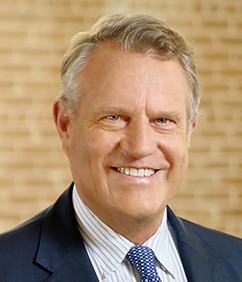Elliot Peters ’85 found his calling as a litigator at NYU Law
Keker, Van Nest & Peters name partner Elliot Peters ’85 frequently works on high-stakes litigation matters, representing clients such as cyclist Lance Armstrong, the Major League Baseball Association, and financier Frank Quattrone. He has been named Litigator of the Week by American Lawyer, he has twice been recognized as an Attorney of the Year by California Lawyer, and he has made the Daily Journal’s list of top 100 lawyers three times.
Peters is also confident that he was the very last person admitted to his NYU Law class in 1982. “I was accepted off the waiting list the day school started,” he remembers. “I was admitted to NYU Law, came down to the bursar’s office to give them my check, and began classes all in one morning.”
Peters says that NYU Law helped him find his path and gave him the tools to follow it. “If you can follow your heart, there’s a lot of amazing things to do with a law degree,” he says. “You really do empower yourself in a lot of ways by getting a law degree and particularly going to such a fantastic law school…. Figure out your own path; find something to do with your law degree that connects with your heart, energizes you, and feels meaningful, and you’ll have an amazing life.”
A Manhattan native, Peters says he first became interested in law as a member of his high school’s debate team. He earned an undergraduate degree in philosophy from Yale University and then worked on a US Senate campaign before starting at NYU Law. When he became involved in the law school’s Criminal Law Clinic, which later evolved into the Federal Defender Clinic, its co-founder Chet Mirsky urged Peters to take a summer internship in the Brooklyn office of Federal Defenders of New York.
“I remember going to court with the federal public defenders and working on all different cases and trials,” says Peters. “I was completely hooked. Being in the courtroom, seeing the jury, and arguing in front of a judge is magic for me.” He began participating in moot court, and received awards for Best Brief, Best Oralist, and Moot Court Champion by a panel of judges that, he recalls, included Ruth Bader Ginsburg, then a judge on the US Court of Appeals for the District of Columbia Circuit.
After law school, Peters clerked for Judge Whitman Knapp in the Southern District of New York, and later served as an assistant U.S. attorney in the same district. In 1991, he moved to California with his wife and two young daughters and joined the firm that was then Keker & Van Nest. He became a partner in 2004, then name partner in 2017.
Among the matters that Peters has handled, he successfully defended investment banker Frank Quattrone against obstruction of justice charges in the first criminal case to result from several Wall Street conflict-of-interest probes in the early 2000s. Peters later represented the Major League Baseball Players Association, and he successfully challenged the US Department of Justice’s seizure of players’ drug testing records in the landmark computer search case United States v. Comprehensive Drug Testing. Peters also represented Lance Armstrong in both criminal and civil matters related to the doping scandal involving the cyclist. A federal criminal investigation into whether Armstrong and his teammates joined in a doping program was closed with no charges. Later Peters secured Armstrong a $5 million settlement deal in a years-long False Claims Act civil case in which the athlete faced liabilities of $100 million. Peters has also defended many top law firms from malpractice claims and represented tech companies in protecting their intellectual property. Last fall, Peters persuaded a judge to dismiss a 10-count indictment against his client, real estate developer John Wessman, in a high-profile public corruption case in Palm Springs.
But Peters cites his defense of John Tennison as the most meaningful work of his career. One morning in 2001, Peters was heading into work when a parking attendant named Bruce Tennison stopped him to ask for help for his brother John. At age 17, John Tennison had been sentenced to 25 years to life in prison after being convicted for a gang-related murder that he said he did not commit.
“[Tennison] gave me some information about the case, and I read some newspaper articles about it and spoke with the defense attorney who had tried the case for John,” recounts Peters. “I came to realize that he was, in fact, innocent.” Peters represented Tennison pro bono in his habeas corpus case, unearthing exculpatory evidence held by the police, including the taped confession of another man. He then sued the city and county of San Francisco, claiming that members of the San Francisco Police Department unconstitutionally withheld evidence at trial. Peters negotiated a $4.6 million settlement for Tennison—the largest wrongful conviction settlement the city of San Francisco had ever paid. Peters received the Northern California Innocence Project's pro bono award in 2015, in part for his work on the Tennison case.
“I’ve done a lot of cases for clients in big [legal] wars who have paid me,” says Peters. “But there’s something about getting a poor, innocent man serving 25 years to life out of jail that is hard to beat in terms of satisfaction.”
Today, he says, the sense of loyalty to his clients and responsibility for the firm bearing his name keeps him inspired. “I’ll find myself walking around my kitchen at four o’clock in the morning thinking about these cases,” he says. “It brings me back to what happened in law school: I found this work and it spoke to me so deeply. I had a calling and was drawn to it, and that’s never changed for me.”
Posted December 14, 2021


